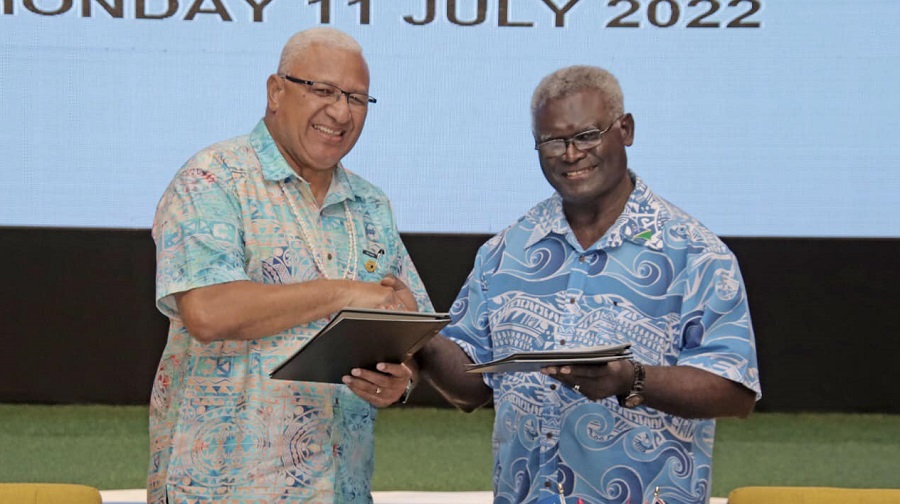Fiji’s Prime Minister Voreqe Bainimarama and Solomon Islands leader Manasseh Sogovare signed a maritime boundary treaty this week, effectively securing each country’s maritime zone baseline and outer limits irrespective of sea-level rise.
Signed in Fiji’s capital city Suva in the margins of the 51st Forum Leaders meeting, the Maritime Boundaries Delimitation Agreement underpins and preserves the two countries’ rights over their maritime zones as parties to the United Nations Convention on the Law of the Sea (UNCLOS), consequently ensuring that their EEZ’s including areas in which they overlap cannot be challenged or reduced amidst climate-change-induced sea-level rise.
Furthermore, having clearly defined maritime zones allows the two countries to effectively manage their ocean and natural resources sustainably.
In signing the document, Bainimarama says it was “a promising step and important milestone towards a brighter future for Fiji and the Solomon Islands” which was echoed by Sogovare who added that “it is a celebration of the rolling out of the ocean chapter of the 2050 Strategy for the Blue Pacific Continent.”
The signing at the Grand Pacific Hotel brings to 36 the total number of maritime treaties that have been formalised within the region, with 12 outstanding including two of Fiji’s relating to its boundaries with Tonga and Vanuatu.
For the Solomon Islands, the signing means they have no pending agreement relating to maritime demarcation having signed the five with countries they share boundaries with including Australia, Papua New Guinea, France, and Vanuatu. Fiji on the other hand shares EEZ boundaries with six countries, having concluded four including Tuvalu, Wallis and Futuna, and New Caledonia.
Such treaties are part of the leaders’ commitment to preserving members’ rights and enhancing regionalism. It builds on the leaders’ recognition of the urgency and importance of security regional maritime boundaries as a key issue for the development and security of the region. At the 50th meeting of leaders in Tuvalu in 2019, they urged member countries to conclude all outstanding maritime boundaries claims and zone. It is also in line with achieving SDG target 14 in securing zones for future generations.
Within the region, there are 48 shared or overlapping boundaries (EEZs), with 36 having been signed following the Fiji-Solomon Islands treaty.










